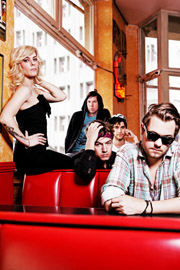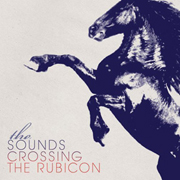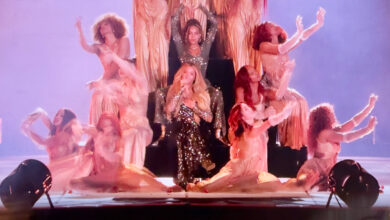Sounds Good
By Gregg Shapiro

It’s only been a few years since Dying to Say This to You, the second domestically released album by Swedish new-wave phenomena The Sounds was released, but it probably seems like a lifetime to their devoted fanbase. But their patience is being rewarded with Crossing the Rubicon (Original Signal Recordings), a 12-song (including the hidden track) disc that fulfills and expands on the band’s promise. Out lead singer Maja Ivarsson sounds as though she’s determined to have us up on our feet and moving, and songs such as “Beatbox,” “4 Songs & a Fight,” “My Lover,” “Dorchester Hotel,” and “Lost in Love” are certainly motivation enough. I spoke with Maja shortly before the release of the new disc.
Gregg Shapiro: I caught your May 2009 Chicago show at the Double Door. The band entered to the song “Anthem” from the musical Chess.
Maja Ivarsson: Yeah. [Laughs]
Who’s the show-tune queen in the band?
Actually, I think [it’s] the guitarist Felix [Rodriguez]. He loves musicals. But actually, it’s so funny that so many American people have asked us if that’s our national anthem ( laughs ). I think it’s hilarious. But it’s such a good tune and it’s very anthemic and big, and we love that track.
I was trying to keep track of the new songs in the set, and I think I counted four that you played.
I think you’re right. It depends on how much I have to work the guys. I usually want to play more new songs. Some of them think it’s a bad idea to play too many when the record’s not out. But I’m like, “Dudes, that’s why we’re here!”
Right! “Beatbox” received an especially rousing reception. How have the new songs been going over in other cities on this tour?
Chicago was a great night. It really was. But I would say that it’s not too far from the kind of reception we got from the other towns. “Beatbox” especially was working really well in Europe when we were out doing a European tour a couple of months ago. That was one of the songs that people got right away. [With the] the first chorus, they are still a little bit like a question mark, but by the second chorus everybody is singing along. Everyone is enjoying themselves. I think it’s that kind of song—its not too deep, not to hard to understand, you just need to hear it once and then you’re in it.
Every old song was also a crowd-pleaser, including the audience singalong on the song “Fire.” How does that make you feel, when you stop singing and the audience sings?
You have to realize that “Fire” is from the first [Sounds] record and that record is really hard to find in America. I talk to so many fans and they said you have to order it or you need to dig for it. So to get people to sing that chorus, just to stop in the middle of a chorus and almost everybody knows the words, it’s so mind-blowing. I’m really proud of my fans. I think we’ve got the greatest fans ever and we’ve had that for quite some time. I think they are loyal and cool and they are always into our shows. I think that’s why we always give a hundred percent for every show. We can’t do anything else. We have to give them everything that we got, and we do every night. They deserve it, and I think it’s the best feeling ever. I can’t really explain it. Otherwise, I wouldn’t be doing it for such a long time….
 The new album is titled Crossing the Rubicon, and there’s a song on the disc that shares its name. The concept of “crossing the Rubicon” involves taking a decisive, irrevocable step, and you even make reference to crossing the river (the Rubicon, if you will) on “Home Is Where Your Heart Is.”
The new album is titled Crossing the Rubicon, and there’s a song on the disc that shares its name. The concept of “crossing the Rubicon” involves taking a decisive, irrevocable step, and you even make reference to crossing the river (the Rubicon, if you will) on “Home Is Where Your Heart Is.”
I think in Sweden people really haven’t heard that saying that much. We need to explain it from the beginning. In Sweden it’s “crossing the point of no return”—it was Ulysses talking to his army. For us, it was our drummer [Fredrik Nilsson]: when we were writing all these songs for preproduction of the record, he came into the studio one day and said, “I have this thing in my head and it’s ‘crossing the Rubicon. It means crossing the point of no return,’” and we were like “Dude, I love that,” because we were thinking about titles for the record and everything.
It means something to us, because for this record we had to pay everything ourselves. We dropped the label that we had in the U.S. We dropped pretty much everyone that we had around us, business-wise. It’s so heartbreaking when the band is working so hard—and we’ve been doing it for so many years now—and you can tell that not everyone else around you is working as hard, and it’s so tough and it’s frustrating as hell. For us it was really important to drop everything and to start from the beginning again and just put everything that we had into this record, and if it fails we don’t have anybody else to blame. But if it goes well, nobody else can take the credit for it either.
So, we played a couple of shows and got pretty good money for those shows, and we picked the producers ourselves and we picked the studios. We worked really hard in our own studio to come up with all the songs that we needed for the record. We did everything ourselves. It was a big thing for us, because we actually turned down pretty big labels in America…. We could have released it a little bit earlier than we did, but we really couldn’t, because we didn’t have the label that we trusted to work with us. But now we have this amazing label called Original Signals Recordings. It’s a small label, and they’re very passionate about music, and they’re in it for the right reasons. They gave us a really good deal, and we thought this was the way to go. I don’t believe in the major record labels anymore.
So for us it was a big step, and that’s why the title is so perfect for this record.
“No One Sleeps When I’m Awake,” the disc opener and first single, makes a powerful statement. Are you the kind of person who remembers who dreams?
Absolutely. All the time.
Is that a good thing or a bad thing?
I think it’s a good thing, I think it’s a very good thing. But sometimes when you wake up, you can still be exhausted even though you’ve slept for eight hours, because you’re in your dreams, this and that happens, and you’re like “Man, I’m so f–king tired.” You’re going through a lifetime in your dreams as well.
But in this song, I think it’s more about the dreams we had when we were younger. About becoming a great band and touring the world and doing what you really wanted to do in life. That’s what we’re doing right now. And all of us are so proud of what we have accomplished. And it hurts sometimes. We’re not the greatest, biggest band in the world yet, but I think we have the opportunity on this record to become that big. The journey has been really long and really tough. We’ve gone through hell and back. We’ve been the same members in the band since high school. Whether you’re in a band or not, I think those years can be turbulent, if you know what I mean. And we’ve been going through those years together and we came out on the other side, and we’re still with our feet on the ground and everything is cool and we love each other still and everything is better than ever. I think that even with the heartache and the pain we’d still do it again.
I also love the amazing song “Dorchester Hotel,” which has the recurring line, “As long as you bring your bible, you’re secure.”
It was actually Felix who wrote that line. It’s a funny line; definitely in America people will raise an eyebrow or two. But I think your bible could be pretty much anything—it’s something that you believe in and something that you trust in. I think with lyrics like that, it’s up to you to make up your own opinion about what it is. That’s the beauty of writing music. For us it’s a story, and we’ve been talking about that story, to make it clear to everybody about what we mean. But it’s so fun to hear everybody else’s opinion about it [laughs]]. I love it. I think it’s a great track.
There’s a strong dance energy on the disc, as on songs such as “My Lover,” “Beatbox,” “Underground,” and “Lost In Love,” which has an a-ha riff in it. In fact, every time I hear “Beatbox,” I picture people doing a line dance to it.
[Laughs]
How would you feel if you inspired a dance craze?
That would be awesome. That would be fantastic. Can you hook me up with those dancers and a choreographer? [Laughs] That would be super.
There is a beautiful hidden instrumental track. How did that come about?
It was one of those tracks we had on Jesper’s [Anderberg] computer. He played it on one of those really small Casio keyboards, and some of the lines are written on that keyboard, and it’s actually recorded from that keyboard. When we listened to it we had at least 25, 28 songs to pick from to put on the album. We still have so many songs that didn’t make that album that are amazing, but we had to keep it to 11 or 12. But this hidden track, “Goodnight Freddy,” it’s a small tune, and we just listened and said, “We shouldn’t do anything to this and just keep it as it is.” It’s kind of a demo version of it, and we said we shouldn’t do any vocals for it, we shouldn’t do anything to it, just leave it on the record as a hidden track. I think it is a beautiful track.
It’s a great surprise.
Yeah, I think we had that in mind, especially for this record. I remember that as a kid Nirvana’s Nevermind had a hidden track. And you loved stuff like that as a teenager—it was like Christmas. Mostly we focused on how every track should be a single, but on this album we tried to make it a complete album. From beginning to end you should listen to it as a journey. It’s going against the times, because I think nowadays everyone is downloading songs, not albums anymore. I guess we’re doing things backwards and it’s fine.
I’m glad that you mentioned the journey, because the album closes with the song “Home Is Where Your Heart Is.” Where is your heart right now?
My heart is where I am at the moment. I think that’s what the song is about. I love that song—personally its one of my favorites. When I recorded the vocals for that song, I got goosebumps from just doing it. It’s mind-blowing when you can be part of your own song and still be blown away by it. It’s a cool feeling and I can’t really describe it in another way. My heart is where I am at the moment, because I think when you’re younger you refer to where you were born, where your family is, and where your roots are, but now we feel so comfortable being around each other and being on the tour all the time, and that actually home is where my heart is. Right now I’m in Lawrence, Kansas, and that’s where I feel at home and secure and safe. That’s where I’m happy with myself and where I am at the moment.
If someone who lives in one of the states in the U.S. in which same-sex couples can marry came to you and wanted to use a song by The Sounds for their ceremony, which song would you recommend?
Ooh, good question, man! I love the track “Underground.” That’s a beautiful song. Maybe I would have to write a special one for those occasions. I would love to do that, but I need to figure something cool out. But otherwise I love that “Underground” is very nostalgic, and I think it’s a great song. It’s a beautiful one.










